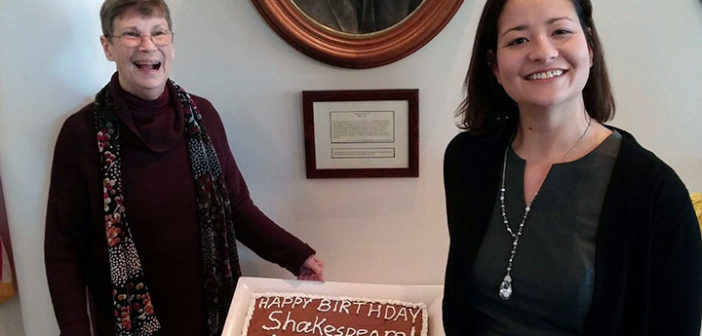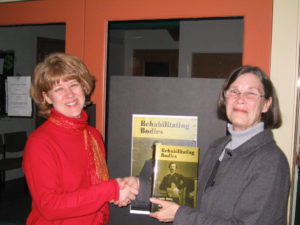EDITOR’S NOTE: The stories shared below were part of a presentation to honor Dr. Sara Eaton for her many years of service to North Central College. Dr. Eaton will retire at the end of the spring term. Dr. Jennifer Jackson read the following during the final faculty meeting of the 2015-2016 academic year:
A storied 27-year career at North Central – and we get five minutes. In the frank words Sara taught me 20 years ago to expect and just-get-over-my-Ohio-self-about — “It’s language! Use it capaciously!” she’d say —“STUFF HAPPENS ….”
The early years:
Priscilla Grundy, Richard Guzman, Fran Navakas, George Karnezis, me, and Sara in the basement of Oesterle Library, where pipes above our desks were wrapped in yellow police tape that said “WARNING! ASBESTOS.”
Richard Guzman recalls, “I was on the search committee that brought Sara to the college. My interview with her was easy and full of good humor. I sensed immediately she’d become one of the department’s leaders. I said, “Sara, it probably won’t be long before you’re telling me what to do…” She answered: “And I’m sure I’ll enjoy telling you what to do as well.”
Jack Shindler shares a story: “A student in my ENG critical methods class resisted theories all term, wanting instead to talk about whether a book had ‘meaningful themes.’ When Sara came to class to talk about historical criticism, the student asked her if Shakespeare had an important ‘theme’ she could hold onto. Sara pondered a minute, said something about it being ‘Friday afternoon,’ and then went to the board, where she wrote: ‘STUFF HAPPENS.’ ”
Jack explains that otherwise, Sara’s “signature” is all about student-centered learning in the best possible sense. She has the uncanny knack of getting students to dig for an idea to put into a question, then begin wrestling with its manifestations in any give work of literature. Somehow the process gets rolling till students are writing test questions as if they were in the professor’s seat; their responses are limited to 500 words, a powerful way to teach editing and craft pointed answers to a complex question. As Jack writes, “There is so much more….”
Francine Navakas says, “Shakespeare courses under Sara became the litmus test, if not Olympic challenge, of whether you could cut it as an English major. The extensive reading list, the expectations for deep reading and exacting research, the attentiveness to Shakespeare’s layers of reference, and the assumption that you could not take yourself seriously if you did not encounter Shakespeare’s texts as a scholar and as a person, did not scare away students as much as leave them clamoring for more.”
Martha Bohrer describes Sara as devoted to her students, her discipline, and the College. “She gives generously of her time to students—they’re in her office for peer editing”—we hear laughter up and down the halls of Kiekhofer—“and she has given sustained leadership to the College: she served as Department Chair, Arts and Letters Division Chair, Faculty Welfare Chair, always thinking how to advocate for a community of scholars, staff and students. Her class sessions and office hours are filled with sly wit and deep thought—a deep regard for reading and careful, well-researched writing. Indeed, Martha writes that Sara “finished her latest scholarly article just this spring. She’s been a calm and conscientious leader of the Division of Arts and Letters and the English Department.”
Lisa Long picks up this thread: “When I came for my campus visit, the student who gave me a campus tour showed up in her friend’s monster truck. Dressed in a suited skirt and heels, I stared up at the cab of said truck. After mulling it over how to get in gracefully for a moment, I hitched my skirt up and did my best to climb in with dignity. This was reported back to Sara, who found it one of my finest qualifications for the job.
Sara truly loves talking to colleagues and students. When you show up in her office—even unannounced and on a really busy day—she invites you in, happy to see you, and listens as if your little cares and interests are the most important things in the world to her at that moment. She is wise and able to put matters into perspective. She is witty. She’s beloved by students: a few years ago they started an “I Love Sara Eaton Facebook” page to honor her.
Lisa writes that “Sara has also taught me what women in leadership roles at North Central College can look like. She can be warm and nurturing, intelligent and strategic. But she doesn’t always have to smile. And sometimes she can even be a little loud when the situation warrants.” Lisa writes that “Even though you are tough and hold others to high standards, you do it all with good cheer, humor, and collegiality.
Sara has truly loved working at North Central College, and it has shown.”
(Dr. Jackson) So many memories – as a new assistant professor with a newborn and the worry those roles create, I found in Sara Eaton both a great dentist and the mothering I’d lost. I learned my son was not a freak I’d irretrievably damage, and found in Sara the kind of colleague-mother-guide-goad—much as we both remain suspicious of the family metaphor—who helped me gain perspective and find my own voice at NCC, sometimes in emails written in PIDGIN GERMAN. When the English Department was housed in a double-wide trailer, she led the task force that brought Media Studies into being—no small feat. She team taught first-year seminars with Jerry Gems, Joan Der, Daphne Lee, and (to our shock and delight) with former Dean Devadoss Pandian, with whom she has long been close. She very nearly taught us how to hug.
In all her work, Sara reminds me in of Louise Gluck’s great line: “Every sorceress is a pragmatist at heart.”
It’s impossible to honor Sara without bringing in a little Virginia Woolf and some Shakespeare to assist: she has puzzled over Woolf’s novels and essays and the Bard’s comedies, sonnets, and tragedies with a diligence and attention to detail that does her Lutheran roots proud.
First, Woolf, from one of Sara’s favorite novels To the Lighthouse:
“But nevertheless, the fact remained, it is almost impossible to dislike anyone if one truly looks at them.”
“Was there no safety? No learning by heart of the ways of the world? No guide, no shelter – but all was miracle…. Could it be, even for elderly people, that this was life? Startling, unexpected, unknown?”
“What is the meaning of life? That was all—a simple question, one that tended to close in on one with years; the great revelation had never come. The great revelation perhaps never did come. Instead, there were daily miracles, illuminations, matches struck unexpectedly in the dark –“
“There is a coherence in things, a stability; something immune from change shines out … in the face of the flowing, the fleeting, the spectral, like a ruby; so that again tonight she had the feeling, already, of peace, of rest. Of such moments, she thought, the thing is made that endures.”
Shakespeare gets the last word: in his late tragedy The Tempest, Sara’s favorite:
“Be not afeard; the isle is full of noises,
Sounds, and sweet airs, that give delight and hurt not.
Sometimes a thousand twangling instruments
Will hum about mine ears; and sometime voices,
That, if I then had waked after long sleep,
Will make me sleep again: and then, in dreaming,
The clouds methought would open, and show riches
Ready to drop upon me; that, when I waked,
I cried to dream again.”
And last –
“Our revels now are ended. These our actors,
As I foretold you, were all spirits and
Are melted into air, into thin air:
And, like the baseless fabric of this vision,
The cloud-capp’d towers, the gorgeous palaces,
The solemn temples, the great globe itself,
Yea, all which it inherit, shall dissolve
And, like this insubstantial pageant faded,
Leave not a rack behind. We are such stuff
As dreams are made on, and our little life
Is rounded with a sleep.”
Thank you, Sara – every happiness in the years ahead.


